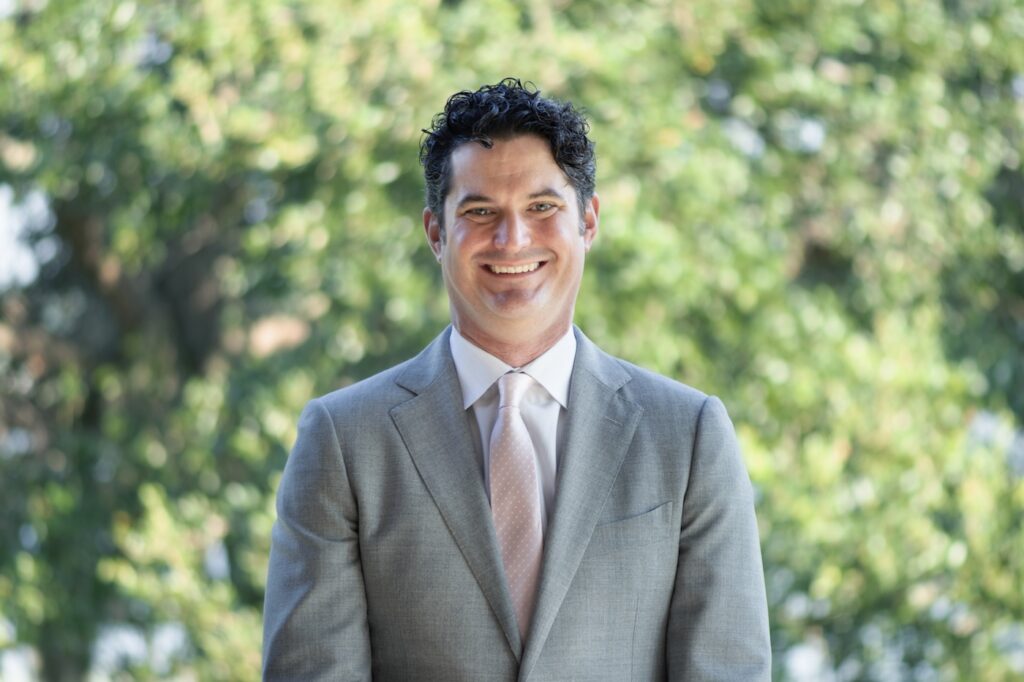
The University of Georgia has promoted Clifton Buck of the Skidaway Institute of Oceanography (SkIO) to full professor, effective Aug. 1, 2025. Buck, a faculty member in the Department of Marine Sciences in UGA’s Franklin College of Arts and Sciences, is a chemical oceanographer with broad interests in the cycling of trace elements in the ocean.
“Promotion is gratifying because it represents an acknowledgment from your colleagues and university that you are doing a good job and contributing to the world,” Buck said. “However, promotion would not be possible without the effort and support from everyone at Skidaway. I am grateful for the students and researchers who have done much of the work we have produced over the last few years. I also appreciate all the folks who work behind the scenes to ensure that the Institute is able to support our shared scientific mission.”
Buck serves as the department’s director of graduate studies and leads SkIO’s Semester at Skidaway field study program. He earned his Bachelor of Science in earth and environmental science from Lehigh University and his Doctor of Philosophy in chemical oceanography from Florida State University.
His research focuses on the pathways by which trace elements enter coastal and marine environments and how physical, chemical and biological cycling affects their distribution. Trace elements, such as the micronutrient iron, play a vital role in the ocean’s ability to support life and influence the distribution of life in the surface ocean.
“I am gratified to see Dr. Buck receive this much-deserved recognition for his contributions to scientific understanding and to the university’s mission,” said Clark Alexander, SkIO director. “Promotion to full professor is awarded when a researcher has both a national and international scientific presence, and Dr. Buck is widely recognized for international collaborative research efforts. He is similarly recognized at the university for the dedication he brings to leadership in classroom teaching and program administration at both the undergraduate and graduate levels. We are fortunate to have him as one of the faculty at the Institute.”
Much of Buck’s work is aimed at better understanding the role that atmospheric deposition of material across the air-sea interface plays in supporting marine biogeochemical cycles. In large parts of the ocean, dust from the continents and particles from human pollution are the primary sources of a range of elements and compounds.
This work requires long, seagoing research expeditions and sustained island-based sampling in remote regions to collect samples of this material and observe variations of the overall amount over time. Buck and members of his team have completed several expeditions in the Pacific and Arctic Oceans as part of the international GEOTRACES program.
In recognition of his role as the primary U.S. expert, Buck was honored to lead the writing of a retrospective commentary on that program published in “Oceanography,” the flagship magazine of The Oceanography Society, in early 2024. These trips often last several months but are critical to improving our understanding of deposition processes in remote areas.
“I was not always able to commit the time to sail on these cruises myself,” Buck said. “None of the contributions we have made to this area of study would have been possible without the efforts of the lab group who worked so hard to collect quality data in very challenging conditions.”
Buck is especially proud of the Hawaii Aerosol Time-Series (HATS) project. Conceived in collaboration with Skidaway colleague Daniel Ohnemus and former postdoctoral researcher Chris Marsay, HATS has successfully linked atmospheric deposition to particle dynamics in the water column.
“HATS grew from an idea I had when I was a postdoc in California,” said Buck. “It took the added expertise and insights of our team to make it a reality. This project was a huge effort that involved two years of atmospheric sampling and six research cruises. The best part has been that HATS is supporting two doctoral students who are well on their way to completing their programs.”
Buck joined SkIO as an assistant professor in 2013 and was promoted to associate professor in 2019. From 2008 to 2010, he was a postdoctoral scholar at the University of California, Santa Cruz. From 2011 to 2013, he was a postdoctoral research associate at Florida State University.
Buck is one of two faculty members in the Department of Marine Sciences to be awarded the honor of full professor in 2025. The other is Amanda Spivak, a biogeochemist and ecosystem ecologist working from UGA’s Athens campus.
Full professor is UGA’s highest faculty rank. It represents recognition of sustained excellence in research, teaching and service.
More information on Buck’s research is available here.
About SkIO
The UGA Skidaway Institute of Oceanography (SkIO) is a multidisciplinary research and education institution located on Skidaway Island near Savannah, Georgia. The Institute was founded in 1967 with a mission to conduct research in all fields of oceanography. In 2013, SkIO was merged with the University of Georgia. The campus serves as a gateway to coastal and marine environments for programs throughout the University System. The Institute’s primary goals are to further the understanding of marine and environmental processes, conduct leading-edge research on coastal and marine systems, and train tomorrow’s scientists.


